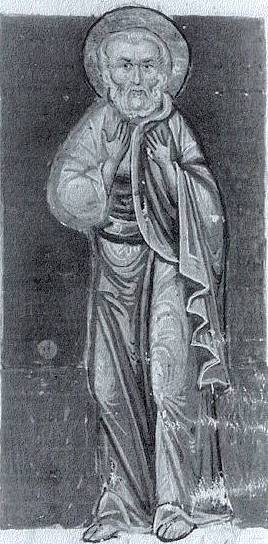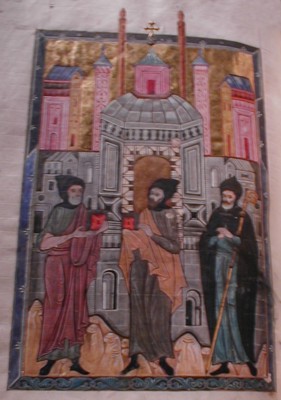Evagrius Ponticus facts for kids
Quick facts for kids SaintEvagrius Ponticus |
|
|---|---|
 |
|
| The Solitary | |
| Born | 345 Ibora (modern-day İverönü, Erbaa, Tokat, Turkey) |
| Died | 399 Scetis (modern-day Egypt) |
| Venerated in | Syriac Orthodox Church Armenian Church |
| Feast | January 16 (Syrian) February 11 (Armenian) |
| Influences | Origen, Didymus the Blind, Anthony the Great, Macarius of Egypt, Basil the Great, Gregory Nazianzen, Melania the Elder |
| Influenced | Palladius of Galatia, Babai the Great, John Cassian, Isidore of Pelusium, The Tall Brothers (Ammonius, Dioscorus, Eusebius, and Euthymius), Melania the Younger, Rufinus of Aquileia, Isaac the Syrian, John Damascene |
| Major works | The Kephalia Gnostica, The Praktikos, De Oratione |
Evagrius Ponticus (also known as Evagrius the Solitary) was a Christian monk and a very spiritual person. He lived from 345 to 399 AD. He was born in a city called Heraclea in Asia Minor, which is modern-day Turkey.
Evagrius was a very smart and talented person. He was known as a great thinker, speaker, and writer. He became one of the most important religious thinkers in the late 300s. He gave up a promising career in Constantinople (a big city back then) to become a monk.
In 383 AD, he joined a monastery in Jerusalem. Later, he moved to Egypt. He spent the rest of his life there, living a simple and strict life as a monk. He spent his time praying, studying, and writing. Evagrius learned from famous church leaders like Basil of Caesarea and Gregory of Nazianzus. He also taught many students, including John Cassian.
Contents
Life Story of Evagrius
We know about Evagrius' life from a few old writings. One important source is a book called The Lausiac History. It was written by his friend and student, Palladius of Helenopolis. Palladius lived with Evagrius for about nine years in the desert.
Another source is a book called Enquiry about the monks of Egypt. This book describes a trip taken by seven monks in 394–5 AD. They visited many monasteries in Egypt and wrote about what they saw. Other shorter writings and church histories also mention Evagrius.
Early Life and Education
Evagrius was born into a Christian family in a small town called Ibora. Today, this place is in Turkey. He went to school in Neocaesarea. There, he became a lector, which is a church helper, under Basil the Great.
Around 380 AD, Evagrius moved to Constantinople. He joined Gregory of Nazianzus, who was the bishop there. Evagrius was promoted to a deacon, another church role. He stayed in Constantinople even after Gregory left. He became an archdeacon, a senior church leader. Evagrius was also present at an important church meeting called the First Council of Constantinople in 381.
Moving to Jerusalem and Egypt
Life in Constantinople was full of exciting things. Evagrius was praised by many people, and he enjoyed the attention. However, he felt he was becoming too proud. He decided to leave the city and go to Jerusalem.
In Jerusalem, he stayed with Melania the Elder and Tyrannius Rufinus at a monastery. But even there, he struggled with pride. He cared a lot about his clothes and spent time walking around the busy city. He became very sick. He only got better after he talked about his struggles with Melania. She told him to become a monk, and he agreed.
After becoming a monk in Jerusalem in 383, Evagrius moved to Nitria in Egypt around 385. This was a place where monks lived together. After some years, he moved to Kellia, a more isolated area. He spent the last 14 years of his life there. He studied under famous monks like Macarius of Alexandria and Macarius of Egypt.
His Monastic Life
Evagrius lived a very strict life as a monk. He ate only once a day. He did not eat fruit, meat, vegetables, or any cooked food. He also did not bathe. His strict diet caused him health problems, and he likely had kidney stones. Evagrius slept only a few hours each night. He spent most of his time thinking deeply and praying.
Evagrius is honored as a Saint in the Syriac Orthodox Church. They celebrate his feast day on January 16. The Armenian Apostolic Church also honors him, celebrating his feast on February 11.
Evagrius' Writings
Evagrius wrote many books and letters. He was one of the first people to write down the teachings of the early Christian monks, known as the Desert Fathers. Most monks at that time could not read or write. Evagrius helped share their wisdom.
Some of his important writings include:
- The Praktikos: This book talks about practical ways to live a spiritual life.
- The Gnostikos: This book is for more advanced students. It discusses deeper spiritual ideas.
- Kephalaia Gnostica: This book explores spiritual problems and solutions.
- De oratione (Chapters on Prayer): This book has 153 chapters about prayer.
- Antirrhetikos (Counter-Arguments): This book lists 487 temptations and groups them into eight "evil thoughts." It helps people understand and fight against bad thoughts.
He also wrote many letters and commentaries on parts of the Bible, like the Psalms and Proverbs.
Evagrius' Teachings
Evagrius was careful about what he taught. For new students, he focused on practical advice. He called this praktike. For more experienced students, he taught more theoretical and deep spiritual ideas. He called this gnostike.
Understanding Bad Thoughts (Logismoi)
One of Evagrius' most famous ideas was his list of eight "evil thoughts" (λογισμοὶ). He created this list around 375 AD. These thoughts are like different kinds of temptations that can lead to bad behavior.
His list was meant to help people understand themselves better. It helped them see their strengths and weaknesses. It also showed them how to overcome temptations. Evagrius believed that the first bad thought was "love of self." All other bad thoughts came from this one.
About 200 years later, Pope Gregory I changed this list. He combined some of Evagrius' ideas to create the more famous Seven Deadly Sins.
Being Without Strong Feelings (Apatheia)
Evagrius used the Greek word apatheia. This word meant being in a state without strong, uncontrolled feelings or passions. He wrote that if your mind is controlled by strong feelings, it cannot pray well. It gets pulled around by these thoughts and cannot be calm. Evagrius believed that reaching apatheia meant being free from these distracting feelings.
The Importance of Tears
Evagrius taught that tears were a very important sign of true sorrow for one's mistakes. He believed that weeping, even for many days, could help a person feel closer to God.
Later Impact and Influence
Evagrius' ideas were very important, but they also caused some debate.
Disagreements About His Ideas
Even during his lifetime, some people disagreed with Evagrius' views. Later, in 415 AD, a writer named Jerome criticized Evagrius. Jerome said Evagrius was too influenced by the ideas of another thinker named Origen. Evagrius had studied Origen's writings. Some of Origen's ideas, like those about human souls existing before birth, were later seen as controversial.
How His Ideas Spread
Because of these disagreements, many of Evagrius' more complex writings were lost in their original Greek language. However, his writings had been translated into Syriac and Armenian languages. These church traditions were not affected by the debates, so his works survived in those translations. Some of these old Syriac books still exist today!
Many of Evagrius' simpler writings about living a strict spiritual life survived in Greek. They were often copied and used in monasteries. Sometimes, they were even mistakenly attributed to other famous monks. It wasn't until the 1900s that many of these works were correctly identified as Evagrius'.
Evagrius' ideas had a huge impact on later Christian thinkers. Even if his name wasn't always mentioned, his teachings were passed on. For example, John Cassian, one of Evagrius' students, shared many of his teacher's ideas. Cassian explained Evagrius' teachings on the stages of monastic life and the eight thoughts. Through Cassian, Evagrius' ideas even influenced Pope Gregory the Great. This is how Evagrius' list of eight thoughts eventually became the famous Seven Deadly Sins.
See also
 In Spanish: Evagrio Póntico para niños
In Spanish: Evagrio Póntico para niños
 | Emma Amos |
 | Edward Mitchell Bannister |
 | Larry D. Alexander |
 | Ernie Barnes |


